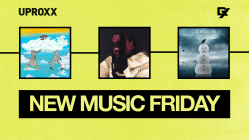Chance The Rapper has returned with a new freestyle — or as he calls it, a “writing exercise” — detailing the history of colonialism in Africa.
On Wednesday (March 29), the Chicago-bred rapper took to Instagram to share the freestyle alongside snippets and pictures juxtaposed with Chance’s rhymes.
The rap highlights how African countries have been exploited for centuries for their resources and labor, with little to no benefit for the people living there. As an example, he cited the forced harvesting of latex from rubber plants in the Congo.
“They stung my savior on a rugged tree/ Mob violence and thuggery,” he raps. “Then they went to Congo for the rubber trees/ Cobalt, Vibranium, Gold mines filled to the brim look like a stadium/ Coffee for the Dutch man/ The French man gone Haiti them.”
It wasn’t the rapper’s first time using his platform to educate his fans about the motherland or prominent figures in Black history. In February, he released an alternate video for his single “YAH Know” as a celebration of Black revolutionaries who have impacted the cultural zeitgeist.
In addition to posting it on YouTube, Chance posted the music video on Twitter and Instagram as part of his “Black History Month project.”
Officially titled “YAH Know (Historical Context Version),” the video opens with a message that reads: “This Black History Month we want to celebrate some of the most important progress we have made as a People. This video highlights some revolutionaries and their revolutions.”
The clip shows a collection of photos and videos throughout the history of Black people in Africa and in the diaspora play out over the 4:15 track. The images are often made to coincide with the exact moments in the song at which Chance references particular individuals or historic occurrences.
Chance’s project helped shine a spotlight on less celebrated figures in Black history as well as some familiar ones, placing Sarah Elizabeth Ray, Kwame Nkrumah and Nandi Azikiwe alongside Marcus Garvey, Fred Hampton and Mohandas Ghandi.
The video also offers fans the opportunity to unearth even more historical context by incorporating multiple clips from the PBS miniseries History of the Negro People: The New Mood, which first aired in 1965; the 1967 documentary Black Liberation; and The Warren Years: The Great Decisions, a film that examines the 1960s Supreme Court rulings brought on by the Civil Rights Movement.
Prior to that, Chance co-organized the Black Star Line Festival with fellow Chicago native Vic Mensa in Ghana’s capital of Accra. Approximately 50,000 fans from all over the world attended the festival.
The pair announced the festival last July, explaining that the event’s name was a tribute to pan-African activist Marcus Garvey’s shipping company.
“Founded in 1919, and operated by Black people, the [Black Star Line] would link America, the Caribbean and Africa, to global shipping and tourism opportunities,” a press release for the festival explained. “The Black Star Line was a symbol of pride, not only for Africans, but also for Black people in all ports of call. After nearly 40 years, the Ghanian government launched their fleet with the same name, in homage to Garvey, and even added a black star to the country’s new flag.”










It’s funny, everyone’s so fixated on the past, that nobody seems to care about the present. Slavery in Libya, thousands of children dying young for mining cobalt to create batteries for phones, electric cars, etc… China has the entire continent of Africa owing them money, and is doing a modern day peaceful, economic takeover. Hell, nobody cares enough about inhumane work places and slavery today to even commit to boycotting products manufactured in nations that have more slaves today that the world at any other point in history. It’s pretty sad that nobody cares about the present day inhumanity.
Yup. Chinese slave camps, Indian slave camps, African slave camps. Nobody cares. Everybody knows, yet people care more about getting their cheap electronics and cloths.
Bro is this guy gonna drop some actual music or he just gonna hit us with loosies for the rest of his life.
HE IS GARBAGE